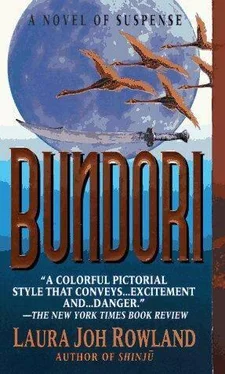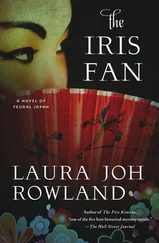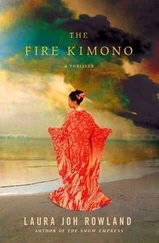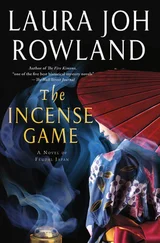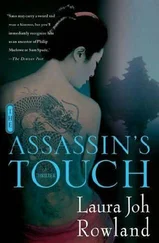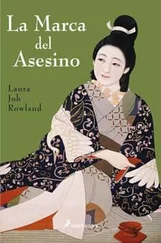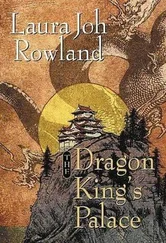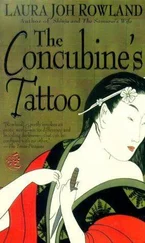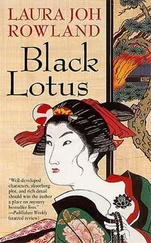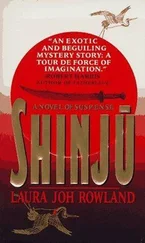Cupping his hands around his mouth, Sano shouted, “Attention!” The crowd quieted; heads turned his way. “Will the persons who discovered the dead man’s remains please step forward.” If they hadn’t already left the scene!
To his relief, two men and a woman emerged from the crowd. They immediately fell to their knees and bowed, mumbling, “Honorable Master,” over and over.
“Rise,” Sano said, embarrassed by their lavish display of respect. Peasants always deferred to samurai, who could kill them and earn no more punishment than a reprimand. But since he’d begun wearing the Tokugawa crest, the courtesies shown him were more than a man of his humble origins could feel comfortable receiving.
To Hirata, he said, “Clear the street if you can, while I interview the witnesses.” More gawkers had swelled the crowd; some, with tattooed arms and chests, looked like hoodlums. In rowdy Nihonbashi, any incident could spark a brawl, which was the last thing he or the city needed.
With unexpected efficiency, Hirata and his assistants began dispersing the crowd. Sano turned to the witnesses. Two were an old peasant couple, huddled shoulder to shoulder, who looked enough alike to be brother and sister-both small, thin, and bent, with missing teeth, gray hair, and age-spotted skin. They wore identical dark blue kimonos and straw sandals, and the same pattern of wrinkles lined their faces. The other man was some twenty years younger, thickset, with flabby jowls and short hair that stood up in a cowlick. His bamboo-handled spear and leather armor tunic marked him as a sentry, one of the civilians who manned Nihonbashi’s gates.
Sano addressed the old man. “Your name?”
“Tarō, master. Proprietor of this pharmacy.” He pointed at the shop. “My wife and I found the body.”
“And you?” Sano asked the sentry.
“Udoguchi,” he whispered. Obviously distraught, he kept rubbing his hands on his short gray kimono. “I found the head.”
Despite Hirata’s efforts, an audience had gathered around them. Sano turned to the old man. “May we talk inside your shop?”
After exchanging awestruck glances with his wife, the proprietor nodded. “Of course, master.” He lifted the indigo cloth that hung from the pharmacy’s eaves and extended halfway to the ground. Sano entered.
The pharmacy’s layout fit the general pattern of most Edo shops-a central aisle between raised plank floors, a low ceiling with skylights to supplement the light from the open storefront. It was crammed with medicines: ceramic urns containing plant extracts; trays of dried ginseng root; bins of herbs, nuts, sliced reindeer horn, and various powders; shelves stacked with boxed remedies. Bitter, sweet, sour, and musky scents filled the air. Having taken stock of his surroundings, Sano sat on the edge of the raised floor and bade the witnesses join him.
The old woman spoke for the first time. “Father, where are your manners? We must offer our guest some refreshment!” To Sano, she said, “Master, please honor us by drinking tea in our humble store.”
Sano reflected that rank gave him advantages he hadn’t enjoyed during his first investigation; namely, cooperation from witnesses. “Very good,” he said after ginseng tea had been served and he’d taken a sip. His hosts relaxed and smiled, settling themselves on the floor. “Tarō- san , how did you happen to find the body?”
“Well,” said Tarō, “when we opened our doors this morning, there it was, lying in a pool of blood in the street.” Unlike the sentry, he showed no sign of shock or discomfort. Perhaps he’d seen so many terrible things in his long life that the murder hadn’t disturbed him unduly.
“What time was this?” Sano asked.
“Oh, before dawn,” Tarō said. “Ours is always the first shop on the street to open in the morning, and the last to close at night. That’s why business is so good.” He gestured toward the entrance, where Hirata was explaining to some customers that the shop was closed for the moment.
“Did you see or hear anything suspicious last night?”
The couple adopted thinking poses that were comically similar: finger on cheek, eyes narrowed. Then they shook their heads regretfully as the pharmacist answered, “No, master. We work very hard all day and sleep very well at night.”
The old woman sighed. “That poor man. Such an awful thing to happen to someone so harmless.”
“You mean you knew Kaibara?” This surprised Sano, for what acquaintance could these peasants have had with a Tokugawa hatamoto who probably employed servants to do his shopping?
“Oh, yes,” the pharmacist said. “Not by name-until today, that is-but since last year, he has walked often in this street. At night, as well as in the daytime.”
Now Sano wondered whether Kaibara’s murder represented, as the shogun believed, an attack on the Tokugawa, or one aimed specifically at Kaibara, committed by someone who knew his habits and had followed him here last night.
“Did Kaibara say why he came here?” he asked. “And did he come at any particular times?”
The old woman shook her head. “He never spoke to anyone. He would just smile and nod. And we never knew when we would see him. Sometimes every day for a while, then not again for a month. But he always came back.” She sighed. “Though he won’t anymore.”
The necessary check into Kaibara’s background was more important than ever now, Sano realized as he turned to the sentry.
“Just a few questions, Udoguchi- san , then you can go,” he said, noticing that the man looked physically ill, his complexion pasty and his mouth trembling. “How and when did you find Kaibara’s head?”
“I was walking home from my post.” Udoguchi spoke in a thin, tight voice that sounded squeezed from his throat. “The fog was lifting. I looked up at the sky, and that was when I saw something-” he swallowed hard “-in the firewatch tower. I climbed up to see what it was… and I found it.” One shaking hand passed over his mouth; the other continued to rub against his clothing.
“Did you see anyone?” Sano asked hopefully.
The sentry shook his head, but in confusion rather than denial. “I don’t think so. I-I was so frightened that I don’t even remember climbing back down the ladder. All I remember is running through the streets, yelling for help. And people coming out of their houses to see what was wrong.” Udoguchi’s voice thinned to a thread of sound. “Someone must have called the police, because the next thing I knew, they were there, asking me questions, making me show them the-” He retched.
Watching Udoguchi’s hands rub against his clothing, Sano realized he was trying to wipe away the bundori ’s taint of death, as well as the horror of finding it. He turned to the pharmacist.
“Please bring Udoguchi some water to wash with.”
He waited while Udoguchi gargled, then cleansed his hands. Soon the sentry’s color returned, and he grew still.
“Then somehow I ended up here, and I saw the body, with all the blood.” Udoguchi spoke calmly now, but barely above a whisper. “I told the police I didn’t know who killed him.”
“Well, I do.” The old woman nodded sagely. “It was a ghost. The invisible ghost of a samurai who walks the earth, thinking he’s still fighting the battle he died in.”
“She’s right,” Tarō exclaimed. “Who else but a ghost can kill and vanish without making a sound or leaving a trace? And who but a samurai from the old days would make his enemy’s head into a trophy?”
Sano stared, appalled. Indeed, eighty-nine years had passed since the warring clans had last taken trophy heads, during the Battle of Sekigahara. And most murders in Edo were straightforward crimes, often with eyewitnesses, plenty of (evidence, obvious motives, and easily identifiable culprits. Thus, these ignorant, superstitious peasants had seized on the ghost story as an explanation for something they didn’t understand. It would terrify the credulous townspeople, increasing the possibility of mass disturbances. And Udoguchi’s response proved its dangerous power.
Читать дальше
